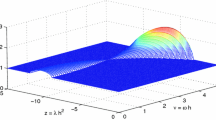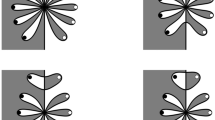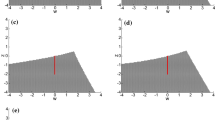Abstract
Classical collocation RK methods are polynomially fitted in the sense that they integrate an ODE problem exactly if its solution is an algebraic polynomial up to some degree. Functionally fitted RK (FRK) methods are collocation techniques that generalize this principle to solve an ODE problem exactly if its solution is a linear combination of a chosen set of arbitrary basis functions. Given for example a periodic or oscillatory ODE problem with a known frequency, it might be advantageous to tune a trigonometric FRK method targeted at such a problem. However, FRK methods lead to variable coefficients that depend on the parameters of the problem, the time, the stepsize, and the basis functions in a non-trivial manner that inhibits any in-depth analysis of the behavior of the methods in general. We present the class of so-called separable basis functions and show how to characterize the stability function of the methods in this particular class. We illustrate this explicitly with an example and we provide further insight for separable methods with symmetric collocation points.
Similar content being viewed by others
References
K. Burrage, Parallel and Sequential Methods for Ordinary Differential Equations, Oxford University Press, Oxford, 1995.
J. P. Coleman and S. C. Duxbury, Mixed collocation methods for y”=f(t,y), J. Comput. Appl. Math., 126 (2000), pp. 47–75.
J. P. Coleman and L. G. Ixaru, P-stability and exponential-fitting methods for y”=f(x,y), IMA J. Numer. Anal., 16 (1996), pp. 179–199.
H. Van de Vyver, On the generation of P-stable exponentially fitted Runge–Kutta–Nyström methods by exponentially fitted Runge–Kutta methods, J. Comput. Appl. Math., 188 (2006), pp. 309–318.
H. Van de Vyver, Erratum to On the generation of P-stable exponentially fitted Runge–Kutta–Nyström methods by exponentially fitted Runge–Kutta methods, J. Comput. Appl. Math., 200 (2007), pp. 778–779.
N. S. Hoang, R. B. Sidje, and N. H. Cong, On functionally-fitted Runge-Kutta methods, BIT, 46 (2006), pp. 861–874.
N. S. Hoang, R. B. Sidje, and N. H. Cong, Analysis of trigonometric implicit Runge-Kutta methods, J. Comput. Appl. Math., 198 (2007), pp. 187–207.
K. Ozawa, Functional fitting Runge-Kutta method with variable coefficients, Japan J. Indust. App. Math., 18 (2001), pp. 105–128.
R. B. Sidje and N. S. Hoang, On the stability function of functionally fitted Runge–Kutta methods, in W. Read and A. J. Roberts, eds., Proceedings of the 13th Biennial Computational Techniques and Applications Conference, CTAC-2006, ANZIAM J., vol. 48, pp. C151–C167, 2007.
Author information
Authors and Affiliations
Corresponding author
Additional information
AMS subject classification (2000)
65L05, 65L06, 65L20, 65L60
Rights and permissions
About this article
Cite this article
Hoang, N., Sidje, R. On the stability of functionally fitted Runge–Kutta methods . Bit Numer Math 48, 61–77 (2008). https://doi.org/10.1007/s10543-007-0158-4
Received:
Accepted:
Published:
Issue Date:
DOI: https://doi.org/10.1007/s10543-007-0158-4




